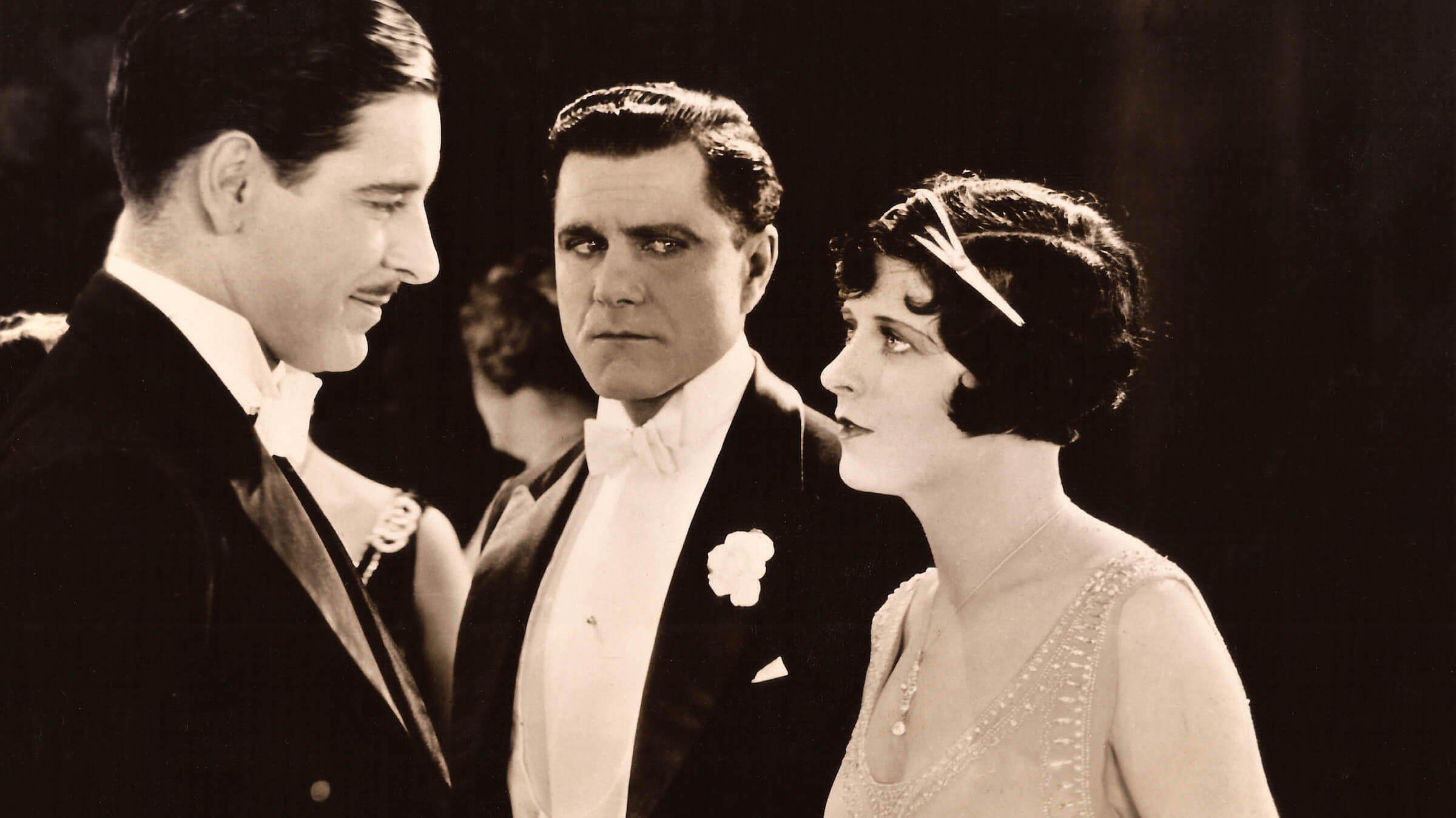In June of 1925 Motion Picture World announced “‘Lady Windermere’s Fan’ Is Lubitsch’s New Warner Film.” Industry insiders must have marveled at the news that Rin Tin Tin, Warners’ profitable pup, would soon be sharing space with the dead, gay, Irish playwright whose 1892 hit play was known for subversive epigrams like, “I can resist everything except temptation.” Perhaps to explain these mismatched studio-mates, Motion Picture World continued: “the executors of Oscar Wilde’s estate were violently opposed to a transfer of the play to the films. Consent was obtained only when the executors learned that ‘Lady Windermere’s Fan’ would be placed in the hands of Ernst Lubitsch.”
This was promotional piffle. According to film historian Charles Musser, Warner Bros. acquired rights not from Wilde’s estate but from the Ideal Film Company, which had made a movie from the play in 1916. But this bit of studio make-believe does convey the reputation German-born Ernst Lubitsch had made for himself after a mere three years in Hollywood. If Rin Tin Tin was Warners’ moneymaker, Lubitsch conferred prestige, a task he accomplished with a series of sophisticated comedies for the studio: The Marriage Circle (1924), Three Women (1924), and Kiss Me Again (1925, believed lost). But as he began work on Lady Windermere’s Fan, and set himself the technical challenge of translating Wilde’s verbal wit into a visual medium, Lubitsch’s relationship with Warners was fraying. The studio had given the émigré director carte blanche, enabling him to develop the dryly suggestive comedic style that became known as “the Lubitsch Touch,” but brothers Harry and Jack never appreciated what they’d made possible. “HIS PICTURES GREAT BUT SUBTLE,” Harry Warner once telegrammed brother Jack. For the Warners, “subtle” was not a compliment.
Mary Pickford brought Lubitsch from Berlin to Hollywood in 1922 on the strength of his international smash Madame DuBarry (1919), a sexy historical spectacle with a tragic ending released in the U.S. in 1920 as Passion. Pickford wanted Lubitsch for her transition to grown-up roles and 1923’s Rosita was the result of their collaboration (after several false starts). The film is a DuBarry-style epic with a Hollywood happy ending, but the production was anything but happy for Lubitsch. He was greeted on his arrival by anti-German demonstrations, Louella Parsons quizzed him on his wartime activities, and the Rosita crew mocked his broken English. “Kommt Lubitsch nicht zurück?” (“Is Lubitsch coming back?”), asked Berlin’s Film-Kurier in April 1923, and after Rosita it appeared likely.
However, Hollywood was sunny and stable after Germany’s exponential inflation and political assassinations. Lubitsch enjoyed the wealth of resources Hollywood studios offered, like expert camera operators and no electricity shortages. And while he may have pioneered the path to California, fellow Germans and other continental colleagues followed—Pola Negri, Walter Laemmle, Paul Kohner, Wilhelm Dieterle—forming a community that softened the ground for the next wave of immigrants in 1933. But what probably clinched the director’s decision to stay was Warners’ offer of creative control: “Lubitsch shall have the sole, complete and absolute charge of the production of each such photoplay, except … in matters involving money,” the six-picture contract read. That one exception—money—became a point of contention.
By the time he started work on Windermere Lubitsch had established a trusted team that included assistant and translator Henry (Heinz) Blanke, writer Hanns Kräly (a frequent Lubitsch collaborator back in Germany), and camera operator Charles Van Enger. He had established a work method, planning his pictures down to the last detail before rolling the camera. He’d also abandoned the big spectacles Hollywood—and Warner Bros.—expected of him, turning instead to the contemporary social comedies he’d made in Germany, but which had never reached U.S. audiences. He used his source material, usually obscure Mitteleuropa plays, as a point of departure rather than a guide. Longtime Lubitsch collaborator Samson Raphaelson later told historian Herman Weinberg: “There was so incredibly little resemblance between any movie I ever made with Lubitsch and the original material, that the original material at best could be reduced to a page-and-a-half synopsis.”
When the original material was written by Oscar Wilde, Lubitsch’s cavalier approach attracted attention. “Epigrams on the printed page or on the stage are delightful,” Lubitsch defended his strategy to the New York Herald Tribune, “but … would much charm remain to long excerpts from Wilde’s play if the audience had to ponder laboriously over the scintillating sentences on screen?” This quote is probably more promotional puffery—could Lubitsch, still struggling with English, have actually produced the alliterative “scintillating sentences on screen”? In fact, Wilde’s play gave Lubitsch the perfect excuse to explore his favorite themes: wobbling marriages, the farcical pursuit of love, and the sexually aggressive woman who tramples on society’s strictures and goes her way unpunished. Wilde’s dialogue was beside the point.
In writing his play Wilde had taken a Victorian cliché—the outcast mother who reenters her daughter’s life in time to save her from a fatal mistake—and shocked audiences by suggesting that the déclassé Mrs. Erlynne is actually superior to the puritanical Lady Windermere. In Lubitsch’s further transformation, Mrs. Erlynne (Irene Rich) gains screen time and completely outshines the film’s title character. Whether she’s squeezing Lord Windermere (Bert Lytell) for money or manipulating her beau Lord Augustus (the scene-stealing Edward Martindel), Mrs. Erlynne is the film’s true protagonist. Her triumphant exit with the befuddled Lord Augustus in tow is the comic punctuation that ends the film.
The critics were unanimous: “Der Herr Lubitsch has done magnificently,” wrote Ted Shane in the New Yorker. “He has attempted and succeeded in transfilming a Wilde without the use of a single tinseled Wildean epigram.” George T. Pardy in Motion Picture News used a musical metaphor, “It is no small feat to transpose an Oscar Wilde drama,” while the Los Angeles Times described the film as “not a literal translation. It has instead the quality of being an impression of the original.” Only Mordaunt Hall of the New York Times missed the point, complaining, “While Ernst Lubitsch’s screen translation of Oscar Wilde’s play, ‘Lady Windermere’s Fan,’ is a worthy production … it shrinks in importance beside the original effort.” Critics singled out for praise the film’s racetrack sequence, a tour-de-force montage of society gossips and lip-licking men peering at Mrs. Erlynne from every angle, during which Lubitsch wordlessly establishes the series of misinterpretations—just who is looking at whom, and why?—that drive the play’s crucial misunderstanding.
Jack Warner had balked at the expense of the racetrack scene, which Lubitsch shot in Toronto for accuracy’s sake (horses run clockwise in England and Canada, counterclockwise in the U.S.). Warners’ deal with Lubitsch—prestige in exchange for control—was turning sour, and Lubitsch biographer Scott Eyman charts the demise of their relationship with a flurry of archived telegrams. A month after Windermere’s gala premiere in New York, complete with dancing girls and a giant fan in the prologue, Lubitsch asked to buy out his contract. He wanted to escape from the penny-pinching Warners and their desire for the DuBarry-like spectacle he’d outgrown. “DON’T ACT HASTY,” Harry cabled from Europe, simultaneously cabling brother Jack, “LUBITSCH MUST MAKE MORE THRILLING PICTURE AND NOT WORRY SO MUCH ABOUT STORY.” He repeated the advice in another cable to Lubitsch: “YOU HAVE PICKED YOUR OWN STORIES AND MADE YOUR OWN PICTURES WITHOUT INTERFERENCE BUT MADE THEM TOO SUBTLE THE WORLD WANTS THRILL AND EXCITEMENT STOP” to which Lubitsch replied, “YOU HAVE NO ONE BUT YOURSELF TO BLAME THAT MY TALENTS ARE WASTED THUSLY STOP” and again proposed a contract buyout. “TELL LUBITSCH NOT TO ACT LIKE BABY,” wired Harry to Jack. The wrangling continued through the production of Lubitsch’s final Warner Bros. picture, So This Is Paris (1926), ending in August with MGM and Paramount footing the bill for Lubitsch’s freedom.
As Lubitsch departed Warners, he left the ungrateful brothers one final gift: The Jazz Singer, which Lubitsch had asked the studio to purchase for him, sent Warners’ stock soaring in 1929. Lubitsch, too, soared to new heights in the sound era, earning acclaim for a series of groundbreaking musicals starring Jeanette MacDonald, followed by a pair of ultra-urbane comedies, Trouble in Paradise and Design for Living. But all this was in the future. In 1926, a sublimely unaware Harry Warner wrote brother Abe of Lubitsch’s contract: “It is a lucky star that this is off our hands.”
Presented at 2017 A Day of Silents with live music by Mont Alto Motion Picture Orchestra

